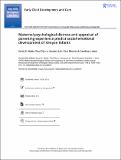| dc.contributor.author | Sarah E Watts, Paul Oburu, Suncica Lah, Paul Rhodes, Caroline J Hunt | |
| dc.date.accessioned | 2020-08-04T11:16:31Z | |
| dc.date.available | 2020-08-04T11:16:31Z | |
| dc.date.issued | 2018-08-03 | |
| dc.identifier.citation | 4 | en_US |
| dc.identifier.issn | : 0300-4430 | |
| dc.identifier.uri | https://repository.maseno.ac.ke/handle/123456789/1799 | |
| dc.description | The article can also be accessed via URL: https://www.tandfonline.com | en_US |
| dc.description.abstract | This study investigated whether higher maternal psychological distress,
lower provision of psychosocial stimulation and a negative appraisal of
parenting experience were associated with lower cognitive, motor,
social-emotional and adaptive behaviour development in children under
3 years of age in Kenya. A cross-sectional design was used, with 81
caregiver–child dyads recruited through convenience sampling. The
mean age of these infants was 8.5 months (SD = 5.6 months, range 23
days to 25.5 months). Higher maternal psychological distress was
associated with lower social-emotional development, but not cognitive,
motor and adaptive development of a child. Psychosocial stimulation
provided by mothers was not related to any developmental outcomes.
Maternal psychological distress and appraisal of parenting experience
were significant, unique predictors of child social-emotional
development. Findings suggest that interventions designed to promote
social-emotional development of young children in Kenya should target
maternal mental health and enhance confidence and experience of
parenting. | en_US |
| dc.publisher | Routledge | en_US |
| dc.subject | Child development; maternal psychological distress; lowand middle-income countries; parenting experience | en_US |
| dc.title | Maternal psychological distress and appraisal of parenting experience predict social-emotional development of Kenyan infants | en_US |
| dc.type | Article | en_US |

